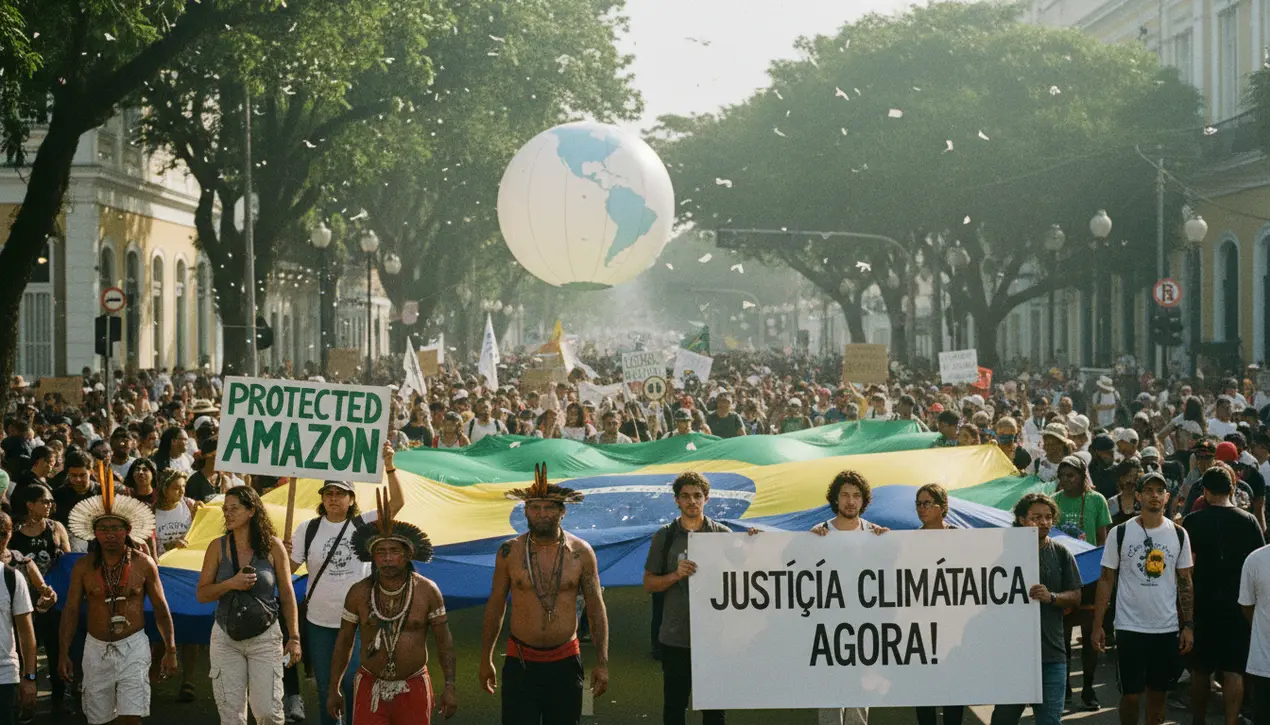
Politicsprotests & movementsClimate Activism
Climate Activists Rally at COP30 Summit in Brazil.
RA
Rachel Adams
2 hours ago7 min read
The streets of Belem, Brazil, transformed into a river of urgent humanity this Saturday as thousands of climate activists, with indigenous leaders at the fore, marched to the gates of the United Nations’ COP30 summit, their collective voice a stark counterpoint to the often glacial pace of diplomatic negotiations inside the conference halls. Under the relentless Amazonian sun, the protest was not merely a demonstration but a vibrant, living ecosystem of dissent and hope; a giant inflatable Earth bobbed above the crowd, a poignant visual metaphor for a planet in precarious balance, while a massive Brazilian flag, emblazoned with the words 'Protected Amazon', served as both a banner and a desperate plea.This mobilization, the first major external action of this critical conference hosted deep within the lungs of the world, carries a weight far heavier than the humid tropical air. The location itself is a statement—Belem sits at the mouth of the Amazon, a region that has suffered catastrophic deforestation and is a frontline in the battle against climate collapse, making the gulf between the protesters' demands and the negotiators' compromises feel especially visceral.For decades, these annual COPs have followed a predictable rhythm of raised ambitions and diluted outcomes, a cycle of hope and disappointment that veteran observers compare to the slow, inexorable creep of sea-level rise. Yet, the presence and power of indigenous communities here is different; these are not just activists but the ancestral guardians of the very carbon sinks the world relies on, their traditional knowledge a data set as valuable as any supercomputer climate model.Scientists like Dr. Elena Silva from the Amazon Environmental Research Institute point out that the Amazon is teetering on a tipping point, where continued degradation could flip it from a vital carbon absorber into a net emitter, a scenario that would render the most optimistic emission reduction targets moot.The protest, therefore, is more than a call for action—it is an intervention. The festive atmosphere, with music blasting and a palpable sense of solidarity, belies the high-stakes drama unfolding.Each chant of 'Justiça climática agora!' is a direct challenge to the economic models and political inertia that have long prioritized short-term growth over long-term survival. The consequences of failure here are not abstract; they are measured in the displacement of coastal communities from Bangladesh to Florida, the intensification of wildfires that have already choked North American and Australian skies, and the collapse of agricultural systems across the Global South.As the negotiators debate Article 6 carbon markets and loss-and-damage finance, the people outside are demanding a fundamental reckoning, a shift from incrementalism to transformation. The outcome of COP30 will be written not only in the final text but in the momentum it creates—or extinguishes—for this global movement. The march in Belem is a powerful reminder that while diplomats negotiate the future in closed rooms, the fate of the planet is being decided, in part, on the streets.
#climate protest
#COP30
#Brazil
#Amazon
#environmental activism
#featured
Stay Informed. Act Smarter.
Get weekly highlights, major headlines, and expert insights — then put your knowledge to work in our live prediction markets.
Comments
Loading comments...
© 2025 Outpoll Service LTD. All rights reserved.